| Listing 1 - 10 of 12 | << page >> |
Sort by
|

ISBN: 1603447121 0585370621 9780585370620 0890969132 9780890969137 9781603447126 Year: 2000 Publisher: College Station, Tex. Texas A & M University Press
Abstract | Keywords | Export | Availability | Bookmark
 Loading...
Loading...Choose an application
- Reference Manager
- EndNote
- RefWorks (Direct export to RefWorks)
Presidents --- Political planning --- White House staff --- Executive departments --- Staff. --- United States --- Politics and government
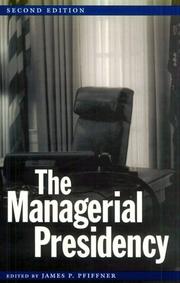
ISBN: 0585369984 9780585369983 0890968586 9780890968581 0890968608 9780890968604 Year: 1999 Volume: no. 4 Publisher: College Station : Texas A&M University Press,
Abstract | Keywords | Export | Availability | Bookmark
 Loading...
Loading...Choose an application
- Reference Manager
- EndNote
- RefWorks (Direct export to RefWorks)
Presidents --- Executive power --- Executive departments --- Bureaucracy --- Government - U.S. --- Law, Politics & Government --- Political Institutions & Public Administration - U.S., Executive Branch --- White House staff --- Staff. --- Staff --- Powers
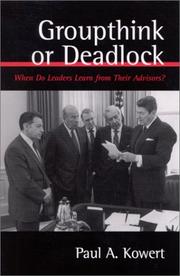
ISBN: 0791489205 0585455287 9780585455280 0791452506 9780791452509 0791452492 9780791452493 9780791489208 Year: 2002 Publisher: Albany State University of New York Press
Abstract | Keywords | Export | Availability | Bookmark
 Loading...
Loading...Choose an application
- Reference Manager
- EndNote
- RefWorks (Direct export to RefWorks)
The danger of groupthink is now standard fare in leadership training programs and a widely accepted explanation, among political scientists, for policy-making fiascoes. Efforts to avoid groupthink, however, can lead to an even more serious problem—deadlock. Groupthink or Deadlock explores these dual problems in the Eisenhower and Reagan administrations and demonstrates how both presidents were capable of learning and consequently changing their policies, sometimes dramatically, but at the same time doing so in characteristically different ways. Kowert points to the need for leaders to organize their staff in a way that fits their learning and leadership style and allows them to negotiate a path between groupthink and deadlock.
Political leadership --- Political consultants --- Presidents --- Presidency --- Heads of state --- Executive power --- White House staff --- Executive departments --- Decision making. --- Staff. --- United States --- Politics and government
Book
ISBN: 0520059344 Year: 1986 Publisher: Berkeley University of California press
Abstract | Keywords | Export | Availability | Bookmark
 Loading...
Loading...Choose an application
- Reference Manager
- EndNote
- RefWorks (Direct export to RefWorks)
Presidents --- -342.511 <73> --- Presidency --- Heads of state --- Executive power --- Staff --- United States --- Etats-Unis. Présidents. Personnel. --- Verenigde Staten. Presidenten. Personeel. --- 342.511 <73> --- White House staff --- Executive departments
Book
ISBN: 9781604266047 Year: 2013 Publisher: Los Angeles Sage Publications
Abstract | Keywords | Export | Availability | Bookmark
 Loading...
Loading...Choose an application
- Reference Manager
- EndNote
- RefWorks (Direct export to RefWorks)
328 <73> --- Parlement. Volksvertegenwoordiging. Regering en parlement--Verenigde Staten van Amerika. VSA. USA --- 328 <73> Parlement. Volksvertegenwoordiging. Regering en parlement--Verenigde Staten van Amerika. VSA. USA --- Presidents --- White House staff --- Executive departments --- Staff --- United States
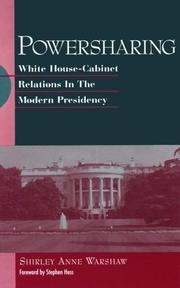
ISBN: 058504340X 9780585043401 0791428699 0791428702 1438423314 Year: 1996 Publisher: Albany : State University of New York Press,
Abstract | Keywords | Export | Availability | Bookmark
 Loading...
Loading...Choose an application
- Reference Manager
- EndNote
- RefWorks (Direct export to RefWorks)
Presidents --- Cabinet officers --- Executive departments --- Political Institutions & Public Administration - U.S., Executive Branch --- Government - U.S. --- Law, Politics & Government --- White House staff --- Staff. --- Staff --- United States --- Politics and government
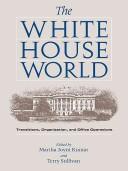
ISBN: 1299054137 1603446869 1585448656 9781585448654 1585442232 9781585442232 1585442275 9781585442270 9781603446860 9781299054134 Year: 2003 Publisher: College Station Texas A & M University Press
Abstract | Keywords | Export | Availability | Bookmark
 Loading...
Loading...Choose an application
- Reference Manager
- EndNote
- RefWorks (Direct export to RefWorks)
Presidents --- White House staff --- Executive departments --- Transition periods. --- Staff. --- Transition periods --- Bush, George W. --- Bush, George, --- Bush, Geo, --- Bush, Dzhordzh Uoker, --- Bush, Dzh. U. --- Bush, Dzh. --- Bush, --- Bushi, Qiaozhi W., --- Bush, Zhorzh, --- Arbusto, Jorge W., --- Bush, Xhorxh W.,
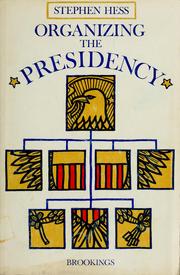
ISBN: 0815735871 9780815735878 Year: 1976 Publisher: Washington, D.C. Brookings Institution
Abstract | Keywords | Export | Availability | Bookmark
 Loading...
Loading...Choose an application
- Reference Manager
- EndNote
- RefWorks (Direct export to RefWorks)
Government --- United States --- #SBIB:328H31 --- 321 (73) --- Instellingen en beleid: VSA / USA --- Politieke organisatie. Staten als politieke machten. Regeringsvormen--Verenigde Staten van Amerika. VSA. USA --- 321 (73) Politieke organisatie. Staten als politieke machten. Regeringsvormen--Verenigde Staten van Amerika. VSA. USA --- Presidents --- White House staff --- Executive departments --- Staff --- Politics and government --- United States of America
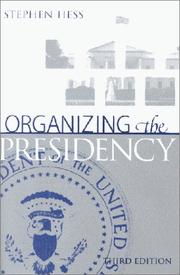
ISBN: 0815736371 081573638X Year: 2002 Publisher: Washington, D.C. Brookings Institution
Abstract | Keywords | Export | Availability | Bookmark
 Loading...
Loading...Choose an application
- Reference Manager
- EndNote
- RefWorks (Direct export to RefWorks)
Presidents --- 321 (73) --- 321 (73) Politieke organisatie. Staten als politieke machten. Regeringsvormen--Verenigde Staten van Amerika. VSA. USA --- Politieke organisatie. Staten als politieke machten. Regeringsvormen--Verenigde Staten van Amerika. VSA. USA --- White House staff --- Executive departments --- Staff --- United States --- Politics and government --- Government --- United States of America
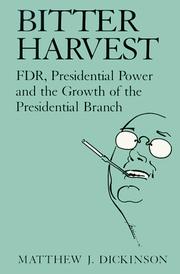
ISBN: 9780521653954 9780521481939 0521653959 0521481937 9780511609275 0511609272 Year: 1997 Publisher: Cambridge : Cambridge University Press,
Abstract | Keywords | Export | Availability | Bookmark
 Loading...
Loading...Choose an application
- Reference Manager
- EndNote
- RefWorks (Direct export to RefWorks)
Bitter Harvest identifies the principles governing Franklin Roosevelt's development and use of a presidential staff system and offers a theory explaining why those principles proved so effective. Dickinson argues that presidents institutionalize staff to acquire the information and expertise necessary to better predict the likely impact their specific bargaining choices will have on the end results they desire. Once institutionalized, however, presidential staff must be managed. Roosevelt's use of competitive administrative techniques minimized his staff management costs, while his institutionalization of nonpartisan staff agencies provided him with needed information. Matthew Dickinson's research suggests that FDR's principles could be used today to manage the White House staff-dominated institutional presidency upon which most of his presidential successors have relied.
Presidents --- Présidents --- Staff --- Personnel --- Roosevelt, Franklin D. --- United States --- Etats-Unis --- Politics and government --- Politique et gouvernement --- #SBIB:324H41 --- #SBIB:328H31 --- #SBIB:AANKOOP --- White House staff --- Executive departments --- Politieke structuren: elite --- Instellingen en beleid: VSA / USA --- Ruzvelʹt, Franklin, --- Rūzvilt, Franklin Dilānū, --- Rūzfilt, Franklin Dilānū, --- Lo-ssu-fu, --- Luosifu, --- F. D. R. --- R., F. D. --- FDR --- רוזוועלט, פראנקלין ד. --- רוזוועלט, --- Roosevelt, F. --- Roosevelt, F. D. --- Roosevelt, Franklin Delano --- 1933-1945 --- Social Sciences --- Political Science --- Staff.
| Listing 1 - 10 of 12 | << page >> |
Sort by
|

 Search
Search Feedback
Feedback About UniCat
About UniCat  Help
Help News
News